#korean vocabulary
Text
One-Page Masterlist
안녕하세요! Hey everyone! I recently got an ask about my old masterlist, which is the same as my broken-down masterlist except it has all of my lessons on one page, rather than on multiple separate posts. Some may find this expanded version easier to navigate, so I’ll keep this up for y’all! My broken-up masterlist, of course, will still be available for those who find that more helpful :)
Hangul Lessons
Consonants
Vowels
Writing/Reading Korean Syllables
Some 받침 Rules
Diphthongs
Stroke Order
Some More 받침 Rules
Irregular Verbs
The Basics
Common Phrases
Numbers
Sino-Korean vs. Native Korean Numbers (Instagram Post)
Sentence Structure and Particles
Present-Tense Conjugations and Formal Language
Adjectives
Questions
Honorifics and Casual Language
Beginner
Negative Sentences
잘 and 못
Past Tense
Future Tense (-ㄹ / 을 것이다)
-ㄹ / 을 까요? (Shall we…? / I wonder…?)
-(으)세요 (Giving Commands / Asking Questions)
Telling Time
-고 싶다 (I want to…)
How to Say “And”
-지만 (However)
아/어/여서 (So…)
Negative Commands
Spacing (띄어쓰기)
Adverbs
ㅂ Irregular
Comparatives and Superlatives
난, 날, & 내가
Upper-Beginner
-(으)면 (If…)
아/어/여도 (Even though…/Even if…)
(으)면 되다 / 아/어/여도 되다 (I can…/You may…)
-아/어도 되다: Asking for and Giving Permission (Instagram post)
-(으)면 되다 & -(으)면 안 되다 (Instagram post)
아/어/여야 되다 and 아/어/여야 하다(Have to / Should)
Present Progressive (-고 있다)
How to Say “Or”
-아/어/여하다
All About 중
How to Use -(으)로
Before & After
-ㄴ/은 채로
Intermediate
Describing Nouns with Verbs (-는 것)
Describing Nouns with Verbs - Past & Future Tense (-ㄴ/은 / -ㄹ/을 것)
Nominalization
것 같다 (I think… / It seems…)
-러 가다 / -러 오다
-(으)려고 (In order to…)
-기로 하다 (to Decide to do Smth)
척하다 (To Pretend)
-게 되다
-군요 / -구나
아/어/여 보다 (to try…)
-은/ㄴ 적 있다 / 없다 (I have / have not)
-ㄹ/을 게요 (Future Tense)
겠다
-ㄹ/을 수 있다/없다 (I can / cannot)
-ㄹ/을 때 (When…)
-ㄴ/는다면 (If)
-(으)면서 and -(으)며
-(으)니까 (Because / So)
-아/어/여주다
-(ㄴ/는)다 (Narrative Form)
Quoting
Let’s…
Quoting continued
(으)ㄹ래요? (Wanna…?)
-죠
-대로
More Quoting - 대 & 래
잘하다 & 못하다 vs. 잘 하다 & 못 하다
-아/어 가지고
-(으)려면
-는 길에 & -는 길이다
-(으)면 vs. -ㄴ/는다면 (Instagram Post)
-았/었을 것이다
-느라고
-는 데(에)
-ㄹ/을 뻔하다
Upper-Intermediate
-ㄴ/는데
-(으)ㄴ/는지 (Whether or not)
-(이)라는…
All About 아무리
-잖아요
Expressing Surprise
-시 (Honorific)
Making Comparisons
-아/어/여지다
I might…
So that…/To the point where…
Causative Verbs
시키다
Passive Verbs (part 1)
Passive Verbs (part 2)
-ㄴ/은가 보다 & -나 보다 (I guess…)
-ㄹ/을수록
Other Meanings of 싶다
-자마자 & -는 대로(As soon as…)
-긴 하다
-치고
-김에
차라리 (Rather)
-(으)ㅁ Nominalization
-기는 무슨 & -기는 개뿔
-고 보니까
-듯(이)
버리다
-(으)면 좋겠다 & -(으)면 하다
-길 바라다
Advanced
-거든(요)
-줄 알다/모르다
-ㄹ/을 테니까 and -ㄹ/을 텐데
-았/었던
아니라 and 대신에
-ㄹ/을 리가 없다
편이다, 별로, and More
-지 그렇다 (Why don’t you…?)
-ㄹ/을 걸
-ㄹ/을 까 보다
-다면서요
-다니 part 1
-다니 part 2
뜻이다 & 말이다
-다가
-더라고(요)
-더니
Some colloquialisms: 아니시에이팅 and 뭐 이렇게
-(으)ㅁ Sentence Ending
-다 보니까
What does 따위 mean?
-ㄴ/는데도
Korean Idioms
Vocabulary
Must-Know People
Must-Know Places
Must-Know Things
Must-Know Verbs
Must-Know Adjectives
Countries
Months, Days of the Week, and More
Clothing (옷)
School (학교)
Autumn (가을)
Autumn (w/Pictures!)
More Questions
House / Apartment (집 / 아파트)
Emotions / Feelings ( 감정)
Animals (동물)
Loan / Konglish Words
Food and Drink (먹을 것과 마실 것)
Parts of the Body (몸)
Counters
Modes of Transportation (교통 수단)
Colors (색깔)
Colors (with Pictures!)
Weather (날씨)
Winter (겨울)
Music & Instruments (음악과 악기)
Baking Gingerbread Cookies
Emergency (비상)
Hygiene & Bathroom (위생 & 화장실)
Indefinite Pronouns
Work / Office (일 / 사무실)
Spring (봄)
Coronavirus Prevention (코로나바이러스 방역)
How to Wash Your Hands (손을 씻기)
Time (시간)
Korean Cuisine (한식)
Summer (여름)
Summer (여름) w/Pictures!
Graduation (졸업)
Identity (독자성)
Korean Text Slang
Similar Words
Makeup w/Pictures! (화장품)
Family (with Pictures!)
Pronouns
How to Say “Still” and “Already” in Korean
Tastes & Textures (맛과 질감)
K-Pop Audition
K-Pop Fandom Terminology
Different Ways to Say “Change”
Flower Names
What Does 원래 Mean?
What does 오히려 Mean?
College
Hanja Lessons
최
수
악
식
급
동
부 & 불
애
출
퇴
예
음
중
학
습
연
생
대
입
인
문
감
과
원
특
만
후
무
Charts
Present, Past, and Future Tense
Question Words
잘 vs. 못 and Negative Conjugations
Future Tenses
-았/었던 vs. -던 (at end of lesson)
Particles
Some 받침 Rules
Gifving Commands
Conjunctions and -아/어/여서 vs. -(으)니까
-(으)면 vs. -다/라면 and Different Ways to Say “And”
How to Say “Or” (at end of lesson)
Telling Time (at end of lesson)
Comparatives and Superlatives
잘하다 & 못하다 vs. 잘 하다 & 못 하다 (at end of lesson)
Comparing 잘하다/못하다, 잘 하다/못 하다, & 수 있다/수 없다
Irregular Verbs
Pop Quizzes
Level 1
K-Pop Breakdowns
TXT - “Cat & Dog”
Twice - “Feel Special”
Enhypen - “Fever”
2NE1 - “Go Away”
Lee Hi - “Only”
“기억을 걷는 시간 (Time Spent Walking Through Memories)”
KCM - “An Old Love Story (흑백사진)”
Taeyeon - “Can’t Control Myself”
Epik High - “Lost One”
Colde - “A Song Nobody Knows”
IU - “My Sea”
Enhypen - “Polaroid Love”
유라 (youra) - “하양 (RAL 9002)″
BTS - “Ddaeng”
Stray Kids - “For You”
Woozie - “어떤 미래 (What Kind of Future)
TXT - “Eternally”
LOONA - “Heart Attack”
Stray Kids - “Muddy Water”
LOONA - “Girl Front”
Pentagon - “Daisy”
BTS - “Sea”
Semester in SK
Nami Island (남이섬)
Things to Buy at Daiso
Shopping Phrases
Ordering Coffee
Signs in Korea
Ordering at a Restaurant
Riding the Seoul Subway
Things at the 편의점
Korean Curse Words
Etiquette in South Korea
Drinking Culture
Hanja in Real Life
Holidays in South Korea
Korean Cuisine
Concert Ticketing in South Korea
K-pop Comebacks in Korea
Summer in South Korea
What I Learned
#korean#korean language#hangul#korean grammar#korean vocab#korean vocabulary#learn korean#learning korean#langblr#Korean langblr#masterlist#apok#apopofkorean#study korean#studying korean#kpop#kpop lyrics#basic korean#beginner korean#intermediate korean#advanced korean#hanja#한국어#한글#한자#한국어 공부하기#한국어 배우기#한국어 문법#한국어 어휘#초급 한국어
2K notes
·
View notes
Text
한국 전래동화에 나오는 어회와 문법 ! - Vocabulary and grammar in traditional Korean fairytales !
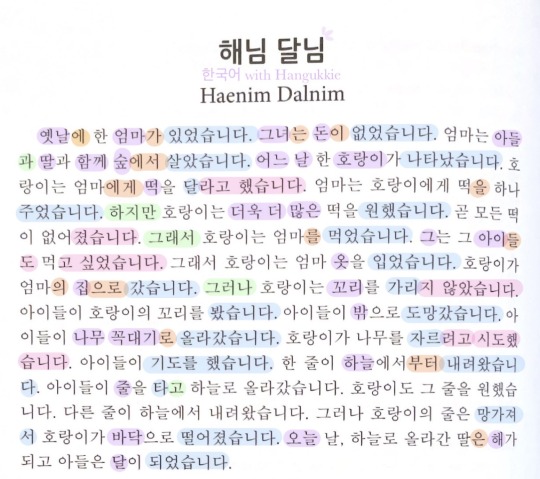
English Translation:
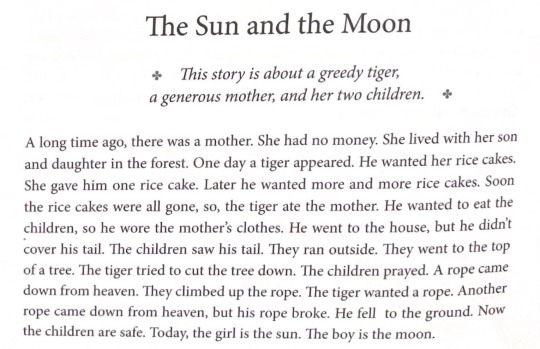
———————————————————
Vocabulary:
옛날 - Olden days
옛날에 - Once upon a time
어머니/엄마 - Mum
그녀 - She/Her
돈 - Money
아들 - Son
딸 - Daughter
함께 - Together
숲 - Forest
어느 - Which
날 - Day
호랑이 - Tiger
떡 - Rice cake
더욱 더 - More and more
많이/많은 - Many/A lot
그 - He/Him
아이 - Kid/Child
아이들 - Kids/Children
옷 - Clothes
집 - House
꼬리 - Tail
밖 - Outside
나무 - Tree
꼭대기 - The top
하늘 - Sky
줄 - Rope
바닥 - Floor
오늘 - Today
해 - Sun
달 - Moon
Grammar - Verbs:
있다 - To exist
없다 - To not exist
살다 - To live
나타나다 - To appear
달다 - To ask/To request (In this context)
주다 - To give
원하다 - To want/To wish/To desire
먹다 - To eat
가다 - To go
가리다 - To cover
보다 - To see
도망가다 - To run away
올라가다 - To go up
자르다 - To cut
기도를 하다 - To pray
내리다 - To get off
떨어지다 - To fall
된다 - To become
Grammar - Sentence Forms:
라고 하다 - For indirect quotations
지다 - To become
도 - Too/Also/As well as
고 싶다 - To want
지 않다 - Is not
려고 - To intend to
시도하다 - To attempt to
Grammar - Connectives:
과 - And/With (With 받침)
하지만 - But
그래서 - So
그러나 - But/However
하고 (고) - And/With
Grammar - Markers/Particles:
에 - To/At (Location and time marker)
가 - Subject particle
는 - Topic particle
이 - Subject particle (With 받침)
에서 - At/In/On/From (Location marker)
에게 - To/For
을 - Object particle (With 받침)
를 - Object particle
들 - Plural marker
의 - Possessive marker
으로 - By/As/For/To/Towards/With (Directional marker)
로 - By/As/For/To/With (Directional marker - with 받침)
부터 - From/Since (Location and time marker)
은 - Topic particle (With 받침)
#korean language#korean langblr#korean#langblr#korean study blog#korean studyblr#study blog#studyblr#korea#korean vocab#korean vocabulary#korean vocab list#Korean stories#Korean fairytales#Korean folktales#korean folklore#한국#한국어#한국어 공부#한국어 읽기#한국어 어휘#한국어 단어#한국어 문법#공부#읽기#어휘#단어#문법#한국 전래동화#전래동화
360 notes
·
View notes
Text
Korean Slang을 좀치네요~
A casual phrase that was been around for a while
뭐뭐.. “좀 하다”
“Done a bit of this / Dabbled in / Done this a bit in my day”
Simply put, it is a playful way of saying someone has done something quite a bit or is pretty good at something. Which is why it’s generally used with the ~네(요) or 거든(요) grammar endings.
For example
“야 너 롤 해??”
“Do you play LoL (League of Legends)?”
“응, 나 좀 하지”
“Yeah, I play a bit”
But this has changed from 하다 (To do) to 치다 (To play a sport or instrument) but still can be used in everyday context.
So instead of saying
“너 베이킹 잘 하네!”
“You’re pretty good at baking!”
You can say
“와아, 이 빵 잘 구웠네. 너 좀 치네”
“Woah, you baked this bread so well. Guess you’re pretty good at baking”
As always, it’s not a direct translation, but you get the gist of it.
이제 구독자분들도 한국어를 좀 치시네요~
(Now you (the readers) know a bit of Korean too)
#korean#한국어#한국어 공부#studyblr#한국어배우기#learning korean#learn korean#slang#korean language#korean slang#language#kpop#korean vocabulary#south korea#seoul
216 notes
·
View notes
Text
Vocabulary: house (rooms)
2023년 9월 19일
안녕하세요!
Today, we will learn how to say each room of the house!
House: 집
Bathroom: 화장실
Dining Room: 식당
Bedroom: 침실
Kitchen: 부엌
Living room: 거실
Downstairs: 아래층
Upstairs: 윗층
Garage: 차고
Garden: 정원
#gigiskjourney#korean langblr#korean language#korean learning#korean study#korean vocab list#korean vocabulary#learn korean#learning korean#studyblr#south korea#korean grammar#korean#korea#korean study blog#study korean#studying korean#한국어
174 notes
·
View notes
Text
V - Love Me Again (lyrics+vocab)

Oh, love me again
I wish you could
Love me again
추억도 의미 없이
내게 넌 사라지고
이쯤에도 I can't let you go, let you go
그 말이 다인 거니?
한마디만 남기고
후회하면 won't you let me know, let me know?
▸ 추억 - memories
▸ 의미 없다 - to be meaningless
▸ 사라지다 - to disappear
▸ 이쯤 - right about now
▸ 후회하다 - to regret
그래, 나 솔직하게 다 말할래
너는 매일 어떤 사람 어떤 곳에
몇 번씩이나 뭘 하는지 널 생각해
Lost without you, baby
▸ 솔직하게 - honestly
▸ 말하다 - to tell, say
▸ 매일 - everyday
▸ 몇 번씩 - many times
▸ 생각하다 - to think (about)
I wish you would love me again
No, I don't want nobody else
I wish you could love me again, again
I wish you would love me again
No, I don't want nobody else
I wish you could love me again, again
나만 자꾸 이런 건지?
내 옆에 딴 사람 괜찮니?
예전으로 천천히
Make it feel better, yeah, make it forever
괜찮다 말하지 마
Said I'm alright, said I'll be fine
I'm sorry 거짓말이야
떠나지마, 저리 가지마 멀리
▸ 자꾸 - all the time
▸ 예전 - before, the past
▸ 천천히 - slowly
▸ 거짓말 - lie
▸ 떠나다 - to leave
▸ 멀리 - far
53 notes
·
View notes
Text
231212 Vocab
반추: rumination, reflection
어떤 일을 여러 번 계속하여 생각함. 또는 그런 일.
The act of constantly thinking about a matter, or such a matter.
역이용하다: turn something to one's own advantage; turn something against itself
어떤 목적을 가지고 있는 것을 그 반대의 목적으로 이용하다.
To use something for a purpose opposed to its original purpose.
어여쁘다: beautiful, lovely
(옛 말투로) 예쁘다.
(old-fashioned) Pretty.
이치: reason, principle, sense
정당하고 도리에 맞는 원리. 또는 근본이 되는 목적이나 중요한 뜻.
A right principle consistent with reason, or underlying purpose or significant meaning.
일구다: create
어떤 현상이나 일 등을 일으키다.
To cause a certain phenomenon, matter, etc.
공통분모: common denominator, something in common
(비유적으로) 여럿 사이에 서로 같은 점.
(figurative) A common point among different people.
궁핍: being poor
물질적으로나 정신적으로 가난하고 여유가 없는 상태.
The state of being materially and mentally poor.
허술하다: shabby; humble
낡고 헐어서 보잘것없다.
Being old and worn out, making it look worthless.
탁상공론: desk theory
실제로 이루어질 가능성이 적은, 헛된 이론이나 논의.
An impractical theory or discussion, whose possibility of coming true is low.
도출: inference
어떤 일에 대한 생각, 결론, 판단 등을 이끌어 냄.
The act of deriving a thought, conclusion, decision, etc., about something.
구현: embodiment, materialization, realization
이념이나 사상, 계획 등을 구체적인 모습으로 나타나게 함.
Making an idea, thought, plan, etc., appear in a concrete form.
#한국어#한국어 공부#공부계#한국어 공부하기#한국어 배우기#new vocab#studyblr#study korean#learning korean#korean#korean vocabulary#south korea#korean language#learning languages#language#langblr#language study#language learning#korean learning#tumblog#tumblr blog#learning#노트정리#공블러
66 notes
·
View notes
Photo

If you're learning Korean, you might have encountered the word "어차피" (eo-cha-pi) at some point. It's a useful word that can be translated to "anyway," "in any case," or "after all." When you use "어차피," you're often indicating that something is inevitable or necessary, regardless of other circumstances.
To use "어차피", you simply need to add it to the sentence.
E.g.
어차피 늦었으니까 천천히 와.
(It's late anyway, so take your time.)
어차피 다른 선택지가 없어.
(There’s no other option anyway.)
그 사람은 어차피 나를 싫어하는 거야.
(That person hates me, after all.)
"어차피" is often used with grammar like ~(으)니까 or -(으)ㄴ/는데 to add more context.
E.g.
어차피 해야 할일이니까 빨리 하고 끝내는게 좋지않겠어요?
(Because it's something you have to do anyway, isn't it better to hurry up and finish it?)
어차피 시간이 없는데 일찍 가는 게 좋을 거야.
(Anyway, since we don't have much time, it's better to leave early.)
어차피 지나간 일이니까 다시 말하지 말아요.
(Since it's a thing of the past anyway, let's not talk about it again.)
어차피 밖에 비가 내리고 있는데 조금더 이야기를 나누자
(It's raining outside anyway, so let's talk a little bit more.)
🌸 🌼 🌻
Support me at: https://koreanlanguageloving.my.canva.site/
#Korean Language#korean langblr#Learn Korean#Study Korean#Hangul#한국어 공부하기#한국어 배우기#한국어 어휘#한국어 연습#한국어#한국어능력시험#한국어공부해요#한국어공부중#한국어공부하기#한국어공부#Korean Vocabulary
343 notes
·
View notes
Text
ART HISTORY WORD LIST
I'm slowly reading a book called 청소년을 위한 한국미술사 (Korean Art History for Youth). In the process I came across many interesting terms that may be useful for those who are interested in Korean art and history and maybe would like to read about such topics in Korean in the future. So I decided to share the vocabulary list. Perhaps, to be continued.
선사 [先史] - prehistory
도안 [圖案] - design
암각화 [巖刻畵] - petroglyphs
청동 [靑銅] - bronze
빗살무늬 토기 - comb-pattern pottery
유물 [遺物] - relic, artifact
미의식 [美意識] - aesthetic sense
창의력 [創意力] - creativity
삼국 시대 [三國時代] - Three Kingdoms of Korea
불교 [佛敎] - Buddhism
부처의 현신 [現身] - the Buddha who appeared in the form of a famine in order to save sentient beings
소재 [素材] - material
국교 [國敎] - established religion
강대국 [强大國] - (world) power, powerful nation
학술 [學術] - scholarship
석총 [石塚] - stone grave
석실봉토무덤 [石室封土무덤] - stone-filled tomb
기원전 [紀元前] - B.C. (Before Christ): 기원전 50년 - 50 B.C.
고고학 [考古學] - archaeology
묘제 [墓祭] - a memorial service held before the grave
전기 [前期] - the former part
평면도 - ground plan (architecture)
초상화 [肖像畵] - portrait
고분벽화 [古墳壁畫] - ancient tomb mural
사당 [祠堂] - shrine
신주 [神主] - ancestral tablet
경외감 [敬畏感] - sense of awe
환희 [歡喜] - (great) joy, delight
전달력 [傳達力]- transmission
구체적 [具體的] - detailed
기인하다 [起因하다] - result from
순수 [純粹] - purity
공예품 - handicraft, craftwork
문화재 [文化財] - cultural properties
보관 [保管] - storage
걸작 [傑作] - masterpiece
보고 [寶庫] - repository
청자 [靑瓷] - celadon
극치 [極致] - the height (of)
영토 [領土] - territory, domain
만주 [滿洲] - Manchuria
수나라 [隋나라] - Sui Dynasty
당나라 [唐나라] - Tang Dynasty
명장 [名將] - great commander
저항하다 [抵抗하다] - resist
패망하다 [敗亡하다] - collapse
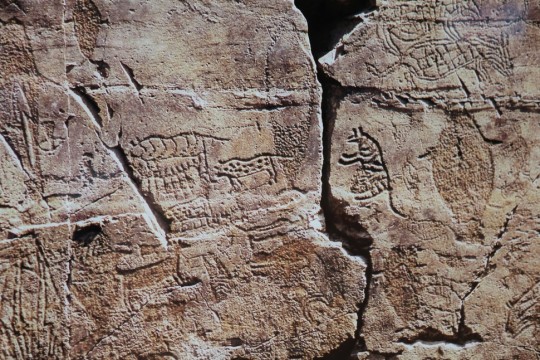
#korean#word list#korean vocabulary#korean language#langblr#learning languages#language study#foreign languages#language blog#korean word of the day#hangul#hanja#korean history#korean art#한국어#한국미술사
58 notes
·
View notes
Text
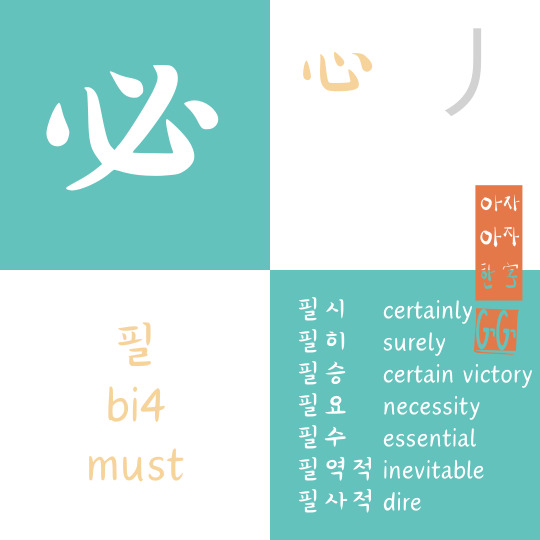
必 bi4 필
if you'd like to support me, check out my ko-fi!
character story:
It is necessary to follow your 丿일 one and only 心 심 heart to live a happy life.
Study vocab here!
Vocab:
필시 Certainly
필히 Surely
필승 Certain victory
\필요* Necessity
필요하다 to need (I need, we need, etc)
필요있다 to be necessary
필수** Being essential
필수과목 required course
필수조건 essential condition
필수품. Necessities
필연적. Inevitable
필사적 Desperate/dire
#5lvl#family: heart#필#bi4#alt:#korea#korean#korean language#korean learning#hanja#korean study#study korean#korean vocabulary#korean langblr#hanja vocab#hanja vocabulary#korean vocab#langblr#language#chinese characters#studyblr#original#ajaajahanja
54 notes
·
View notes
Text
Korean Weather Vocabulary
Watch my lesson on weather in Korean: https://www.youtube.com/watch?v=D0V_FJsVzkI
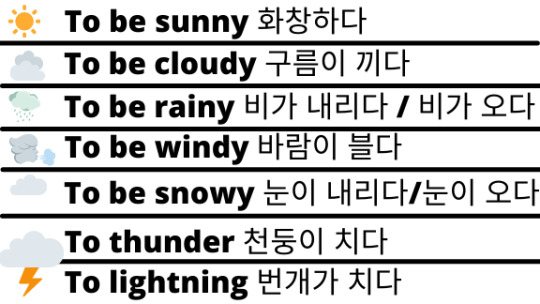
#korean lesson#learn korean#korean#korean vocabulary#korean vocab list#korean vocab#beginner Korean#beginner korean lesson#Korean language#language learning#learning korean#languageblr#language study#langblr#weather in Korean
43 notes
·
View notes
Text
Phrases of the Week #1
발 디딜 틈이 없다: to be crowded, packed
(lit.) no room to place one’s feet
이 음식점은 회사원들이 많이 와서 점심시간에는 발 디딜 틈이 없다. A lot of office workers come to this restaurant, so it’s crowded at lunch time.
출퇴근 시간에 지하철은 발 디딜 틈도 없다. During rush hour, the subway gets jam-packed.
발목을 잡다: for something to hold you back, for something to catch up with you
(lit.) to grab one’s ankle
일이 그의 발목을 잡고 있어서 그는 휴가를 갈 수 없었다. He could not go on a holiday because he was chained to his work.
그녀는 언젠가는 자신의 과거 문제들이 결국 자기 발목을 잡게 될 거라고 두려워했다. She was terrified that one day her past problems would catch up with her.
입에 게거품을 물다: to foam at the mouth (in anger)
내가 돈을 더 달라고 하자 그는 입에 게거품을 물었다. He frothed at the mouth when I asked for more money.
그가 나에게 욕을 하기 시작하며 입에 게거품을 물었다. He started swearing at me and was foaming at the mouth.
12 notes
·
View notes
Text
Semester in SK: Korean Curse Words
안녕하세요 여러분! I’m sharing yet another Instagram post with you all--this one is about a bunch of Korean curse words! Very silly, I know, but curse words are a big part of any language and can be fun to learn about! Of course, be careful when using these and please do not use them often--I’m just sharing them for fun and so you can recognize them if you hear them :) I hope you enjoy! 화이팅!

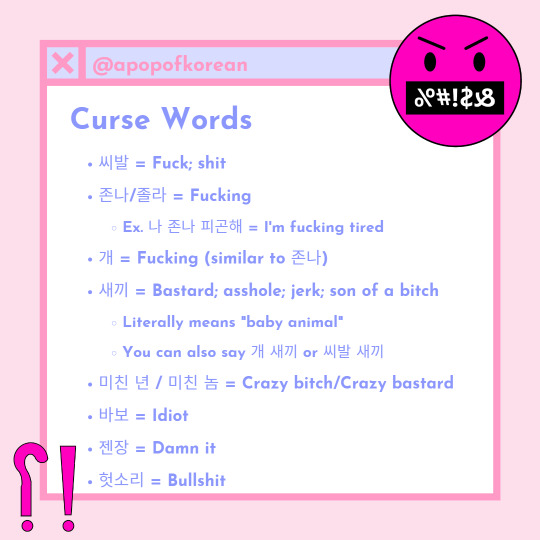
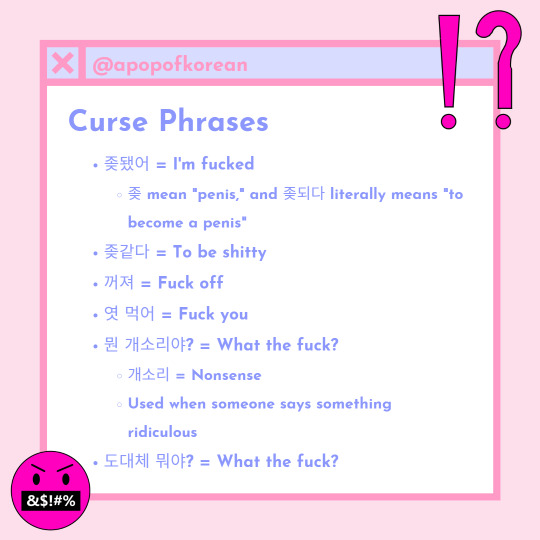
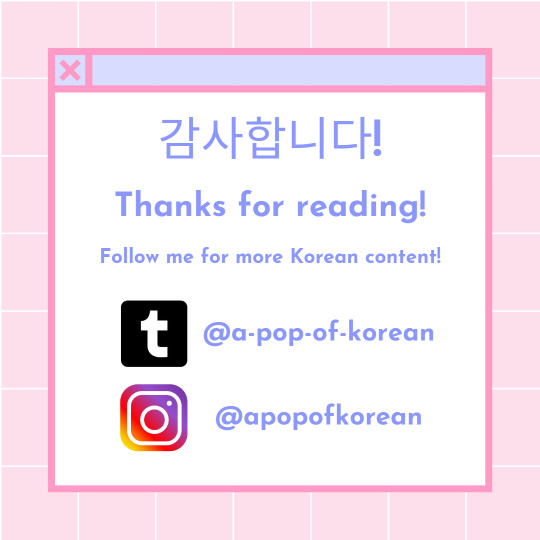
My masterlist
Join my Discord chat here to practice Korean with others!
Follow me on Instagram here for more Korean content!
Get Drops Premium using my affiliate link to expand your Korean vocab!
Check out my Ko-Fi to support this blog and my studies! Thank you for your generosity!
#korean#korean language#korean vocabulary#korean vocab#study abroad#learn korean#learning korean#study korean#studying korean#korean culture#유학#유학생활#한국#한국 문화#어휘#한국어#한국어 공부하기#한국어 배우기#langblr#korean langblr
389 notes
·
View notes
Text
졸업 🎓!! - Graduation 🎓!!


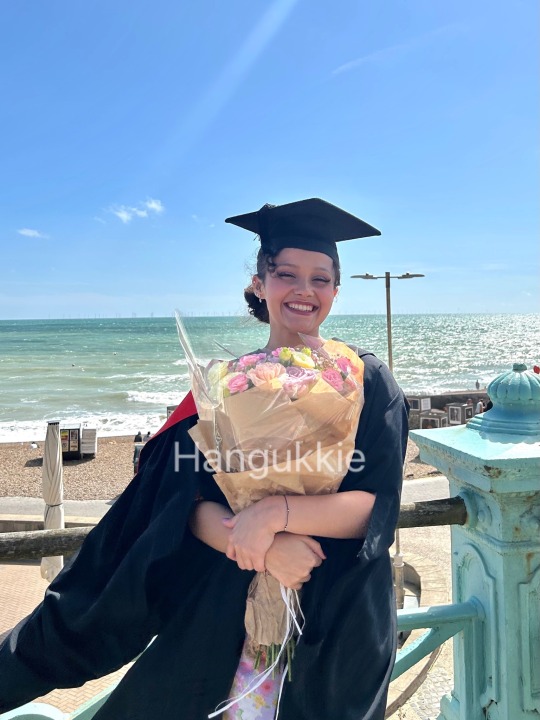

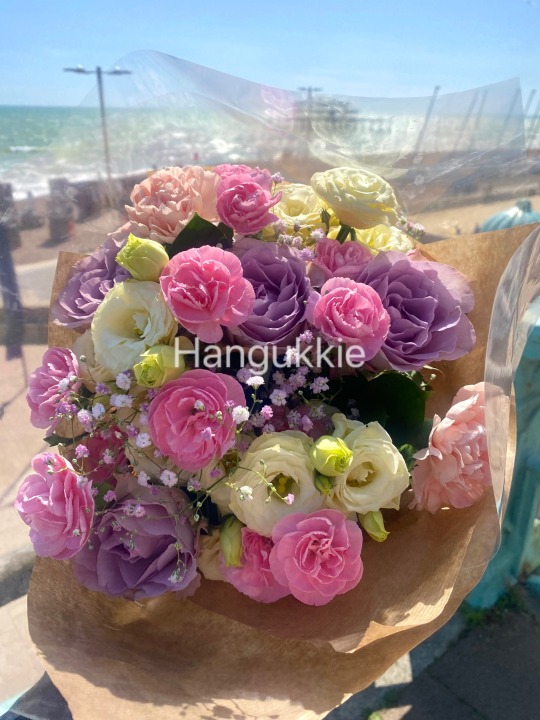




캬아ㅏㅏ~~ 졸업했어요 🥹💐🎓!!
———————————————————
Aaaaaaa!! I graduatedd 🥹💐🎓!!
#I FINALLY GRADUATED AAAAAAAAAA YESSSSSSSS YAHOOOOO WOOHOOOO YIPPEEEEE AJKWNHDBSBEJSJSBWBSHSMKH !!!#korean language#korean langblr#korean#langblr#korean study blog#korean studyblr#study blog#studyblr#korea#korean vocab#한국어 어휘#korean vocabulary#한국#한굴#한국어#어휘#hangul#korean vocab list#한국어 일기#한국어 연습#한국어 공부#졸업#셀카#graduation#personal#졸업식#졸업했어요#university#대학생
46 notes
·
View notes
Text
random korean vocab
공격하다 - to attack
예감 - premonition, hunch
붙잡다 - to catch, grab
막다 - to block, obstruct
기절하다 - to faint
7 notes
·
View notes
Text
Vocabulary: body.
2023년 7월 20일
안녕하세요!
Today i'll share some body's vocabulary.
Head = 머리
Face = 얼굴
Neck = 목
Shoulder = 어깨
Elbow = 팔꿈치
Arm = 팔
Hand = 손
Finger = 손기락
Thigh = 허벅지
Leg = 다리
Knee = 무릎
Feet = 발
Toes = 발가락
Next time i'll get into the face parts!
See you!
#gigiskjourney#korean langblr#korean language#korean learning#korean study#korean vocab list#korean vocabulary#learn korean#learning korean#studyblr#korean study blog#study korean#studying korean#korean#south korea#korea#korean grammar#한국어
245 notes
·
View notes
Text
Agust D - Amygdala [lyrics+vocab]
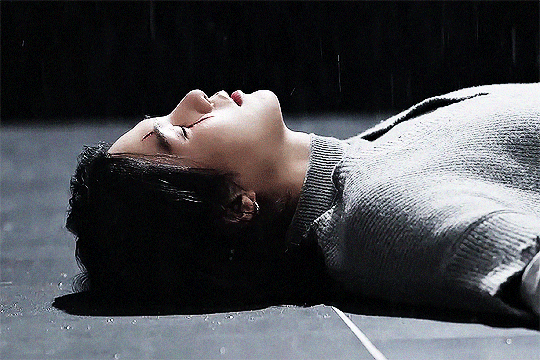
I don't know your name
I don't know your name, yeah
I don't know your name
요즘 기분은 어때?
I don't know your name, your name, your name
기억들로 여행
지우고픈 일들
요즘 기분은 어때, 어때, 어때?
▫ 요즘 - lately
▫ 기분 - mood
▫ 요즘 기분은 어때? = How have you been feeling lately?
▫ 기억 - memories
▫ 여행 - travel, trip
▫ 지우다 - to erase
지우고픈 일들 = 지우고 싶은 일들 = Things I want to erase
천구백구십삼
내가 태어난 달
엄마 심장의 수술, 수술, 수술
별의별 일이 많았지
뭐가 이리 다사다난한지
기억조차 안 나는 기억도
다 꺼내 보자고 하나씩
다 꺼내 보자고 하나씩
▫ 태어나다 - to be born
▫ 달 - month
▫ 심장 - heart
▫ 수술 - surgery
▫ 별의별 - all kinds of, various
▫ 다사다난하다 - to be eventful
▫ 꺼내다 - to take out
▫ 하나씩 - one by one
최선들의 선택
다음 차선들의 선택
차차 선들의 선택, 선택, 선택, yeah
원치 않던 일들
내 통제 밖의 일들
자 집어넣자 하나둘
그래 하나둘, 그래 하나둘
▫ 최선 - the best
▫ 선택 - choice, decision
▫ 차선 - the second best
▫ 원하다 - to want
▫ 통제 - control
▫ 밖 - outside, out of
▫ 집어넣다 - put sb into, throw sb into
I don't know your name, your name, your name
기억들로 여행, 여행, 여행
I don't know your name, your name, your name
자 지워보자 하나씩, 그래 하나씩
My amygdala (My amygdala)
어서 나를 구해줘 어서 나를 구해줘
My amygdala (My amygdala)
어서 나를 꺼내줘 어서 나를 꺼내줘
My amygdala (My amygdala)
My amygdala (My amygdala)
이곳에서 구해줘 어서 빨리 꺼내줘, yeah, yeah
▫ 어서 - hurry, fast
▫ 구하다 - to save
▫ 이곳 - this place, here
▫ 빨리 - fast
Uh-uh, 그래 참 별의별 일이 많았지
Uh-uh, 귓가엔 엄마 심장 시계 소리
Uh-uh, 전하지 못했던 내 사고 소식과
스케줄 중에 걸려 온 전환 아버지의 간암 소식
(Woah-oh) 최선의 선택들이 맞았었길
(Woah-oh) 그 또한 모두 지나가 버렸기에
그래서 이 수많은 고통은 날 위한 것일까
끊임없던 시련은 날 죽이지 못했고
다시금 나는 연꽃을 피워내
▫ 귓가 - around my ears
▫ 엄마 심장 시계 소리 - the sound of the clock in my mom's heart
▫ 전하다 - to convey
▫ 사고 - accident
▫ 소식 - news
▫ 스케줄 - schedule
▫ 전화가 걸려오다 - to get a phone call
▫ 간암 - liver cancer
▫ 맞다 - to be correct
▫ 지나가다 - to pass
▫ 고통 - pain
▫ 끊임없다 - to be ceaseless
▫ 시련 - ordeal, hardship
▫ 죽이다 - to kill
▫ 다시금 - again
▫ 연꽃 - lotus
▫ 피우다 - to bloom
135 notes
·
View notes